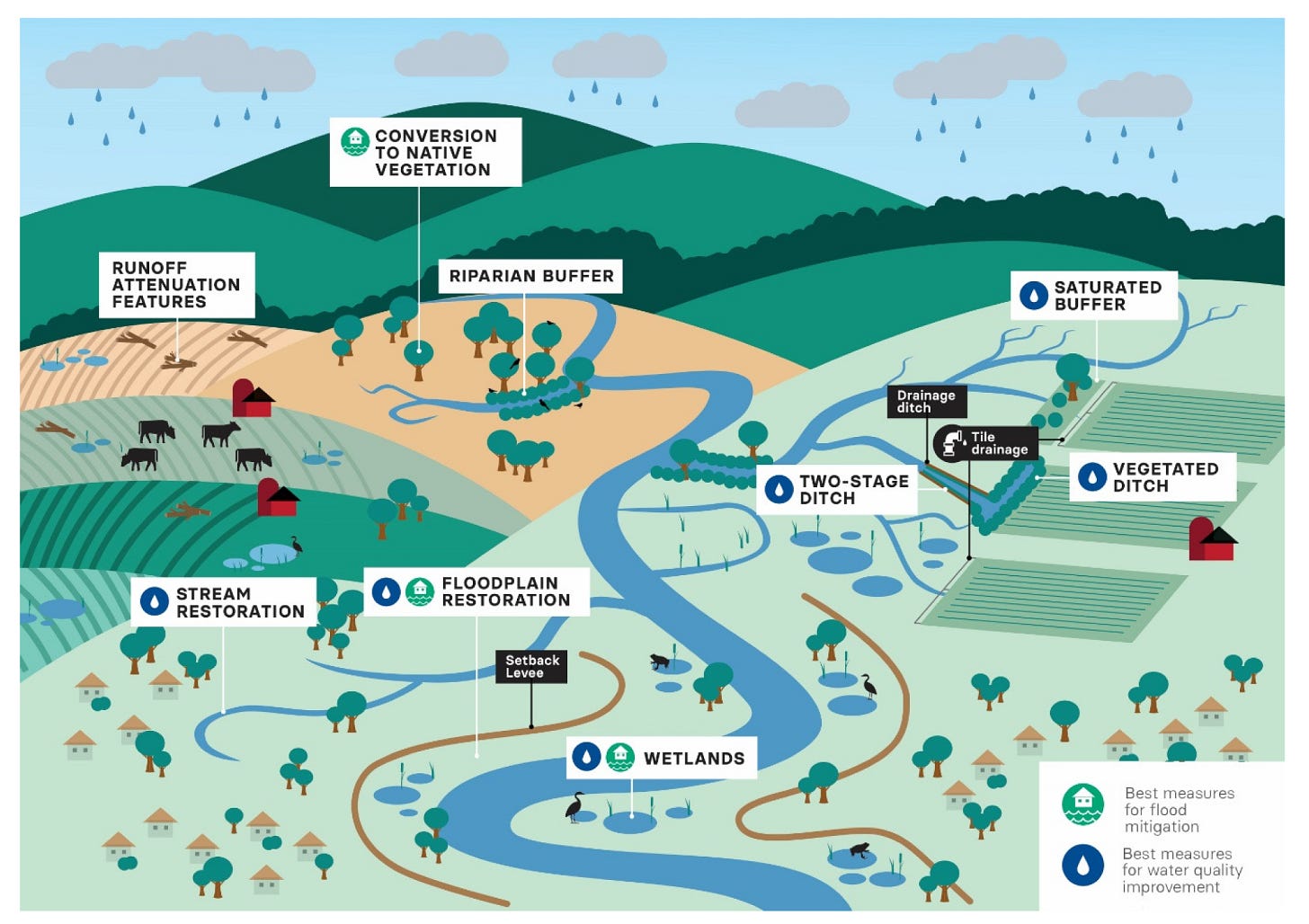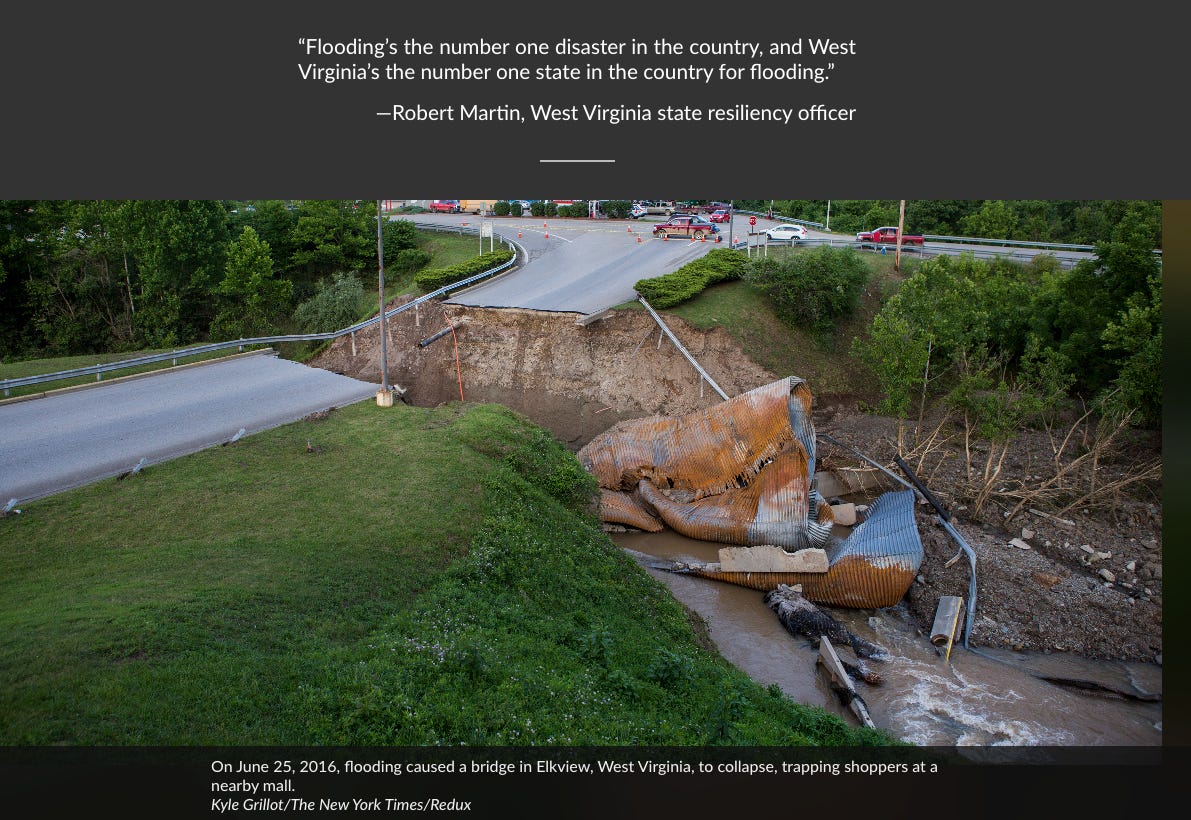Flooding is Appalachia's own quantum insanity problem
Without significant federal and state investments in flood mitigation to prepare for flooding, and to rebuild differently, it will continue to destroy the lives of the most vulnerable
Appalachia is sadly suffering greatly from flooding again.
Before I get into the point of this post, I want to link to a few pages that you can follow for the latest updates and where to go if you want to help with donations or time/resources.
EKY Mutual Aid is probably the best grassroots rapid response resource in Eastern Kentucky, and they can always use an extra few bucks.
This spreadsheet provided by Appalachians for Appalachian is an evolving list of ways you can help
I was hoping to make this week’s post more light-hearted, but I didn’t feel I could avoid this topic given the circumstances.
Deadly catastrophic flooding has once again ravaged Appalachia and the South. West Virginia, Tennessee, Kentucky, Georgia, Mississippi, and god knows where else all got absolutely devastated by flash flooding over the weekend. This would be terrible in its own right, but it also feels so tragically unfair, given it hasn’t even been six months since the historically catastrophic1 Hurricane Helen that tore apart Western North Carolina and East Tennessee.
Clearing up something
That old phrase “Insanity is doing the same thing over and over and expecting different results” is often attributed to Albert Einstein. Scientific American clears that up somewhat by contextualizing it as “quantum insanity.”
That sounds very smart, though I don’t really understand it to be honest.2 I am using it in the title for that purpose to get people’s attention because I believe the message of this post is very important.
Doing something repeatedly expecting a different result can often be useful in certain circumstances, but as I’m about to explain — not this one.
Dusting off my old floodplain managers association hat
Many of you probably didn’t know this, but earlier in my career — which has spanned many fields because I have this mental illness3 called indecisiveness — I worked for about 3 years in Tennessee on grassroots organizing to reform the National Flood Insurance Program (super sexy work I knowwwww).4
It also involved working to get investments in flood-ready resilient infrastructure, among other things.
So, oddly enough, I know at least a little bit about the topic of flooding.

For a time, I worked as a contractor on behalf of the Pew Charitable Trusts Flood-Prepared Communities campaign.
The government needs to be proactive, not just reactive, about flooding
When flooding continues to happen, as it appears to be in Appalachia, it creates a vicious cycle of devastation, recovery, rebuild, and then devastation again.
We know that the flooding isn’t just going to stop.
Climate change is happening.
Without doing anything to change the way we rebuild when rebuilding happens, our communities will be set up to sustain the same (often worse) damages as the last time.
The big problem is that many of the communities that are hit the hardest are also the poorest. Obviously, people can’t be expected to foot the bill for investing in elevating their homes or investing in vegetation buffers, etc. The government needs to step in to make major investments in how built infrastructure is made so that it can withstand — or, buzzword, mitigate — catastrophic flooding (WHICH IS POSSIBLE).5
Governments also need to move faster and prioritize this stuff!
West Virginia started to take action when they created a resiliency office in the aftermath of the catastrophic 2016 floods, though it has struggled in the years since it launched. Funding for the program has been hard to come by, and without funding you can’t really do much.
As recently as June 2024, the program had nearly finished its flood resiliency plan, but still lacks funding to fully function at accomplishing its goal of “minimizing the loss of life and property, maintain economic stability, and improve recovery time by coordinating with stakeholders to implement disaster resilient strategies.”6

My conclusion
I want to be clear: there are many things that need to change from a policy and action standpoint to help mitigate future loss when the next major flood comes to Appalachia. I’m also not trying to sound preachy from the sanctity of my dry haven where I write this post today. As I write this, I fully acknowledge that people are suffering and will continue to suffer. I am immensely privileged that I am not one of those people.
The reason I’m writing this is that this is not talked about enough. Lots of people flippantly say “CLIMATE CHANGE” when stuff like this happens.
Fine. Not arguing with you. But let’s talk about what needs to change so that our friends, family, and neighbors aren’t losing their homes and their lives.
Because make no mistake, the people who suffer the most from flooding in Appalachia are ALWAYS the ones who have the least. Always.
This week, I’m listening to Shelem — a rapper from Huntington, WV who is so talented that it should be a crime he isn’t doing stadium tours right now.
I swear my recs won’t ALWAYS be West Virginia people! But Kendrick Lamar’s iconic7 halftime show got me listening to one of my favorite Appalachian rappers — Shelem.8
Shelem is a licensed processional Engineer by day who creates incredible music outside work9.
Shelem is extremely creative and one way that manifests is through my favorite song of his, “Butter”. He wrote the song during the height of the pandemic by asking fans to submit random words to make into a song. He created it using 43 fan-submitted words: 38 for the lyrics, 5 for the beat.
NPR did a fantastic interview with him a few years ago — be sure to give it a look!
I’m genuinely having trouble finding new words to describe these awful weather events
I fucking love science, but was never the best student at it, so to speak
We work in humor where we can here, folks
The headline above is misleading and potential misinformation. I am not a floodplain manager. I did, however, attend a Tennessee Association of Floodplain Managers (TNAFPM) conference once in Chattanooga (it was dope) and got a cool hat from it!
What also sucks is that sometimes, home buyouts can be helpful in circumstances where infrastructure investments cannot do much to help improve flood preparedness. I understand skepticism toward this, given how the government has been known to treat poor Appalachians in its history. I also know that I’m saying this from the luxury of my not flooded town house. But just feel the need to point out that it is a proactive measure that can be provided by the government and taken advantage of as an option for people.
I’m not trying to dog on the resiliency office, just to be clear. I think things like these should be funded and prioritized is my point.
The way he used his dancers as his storytellers was an expertly done poetic touch, and the whole performance pissed the right people off. 10/10.
Fun fact, he's also buddies with last week’s music rec, Corduroy Brown
I know the feeling of needing a creative outlet outside of one’s day job!










